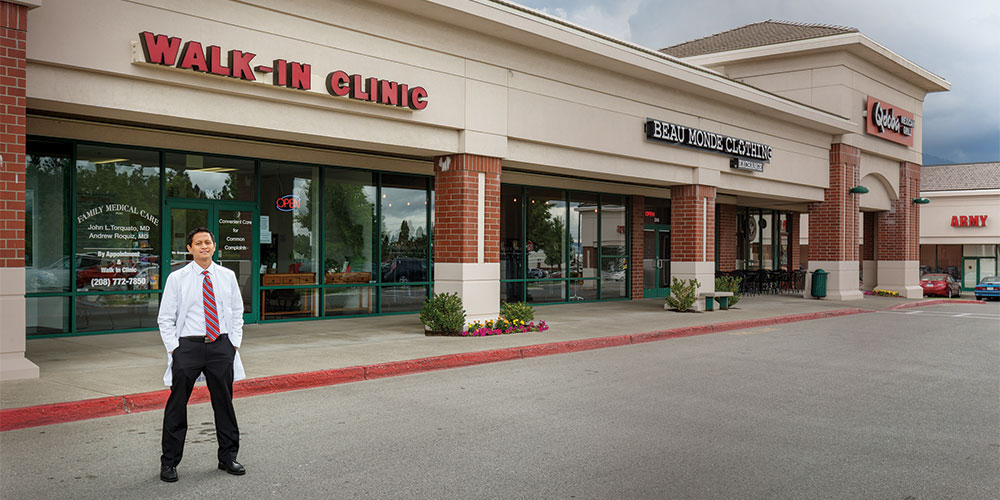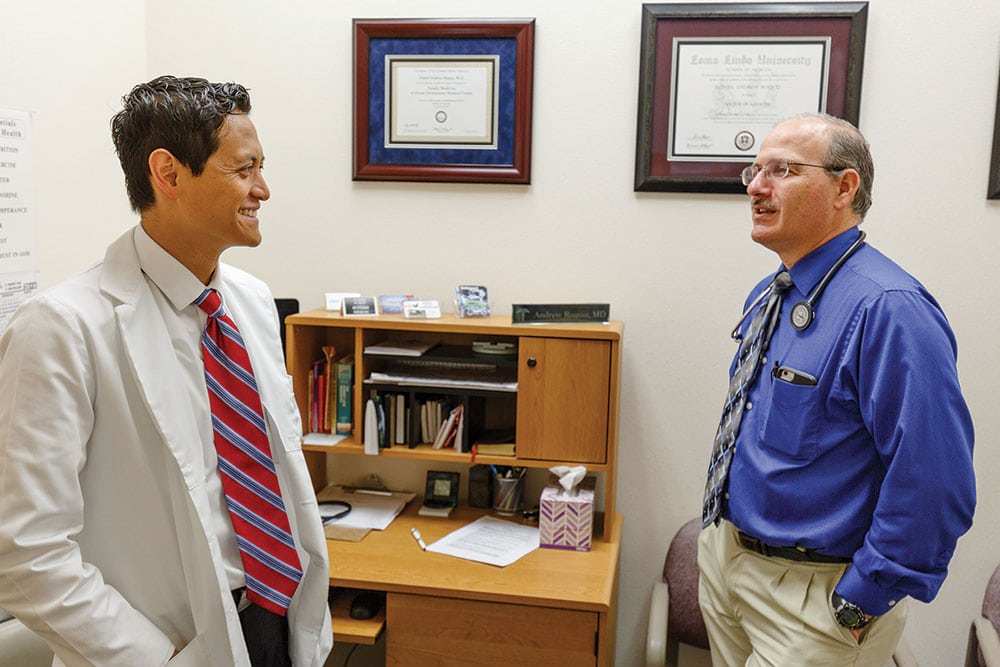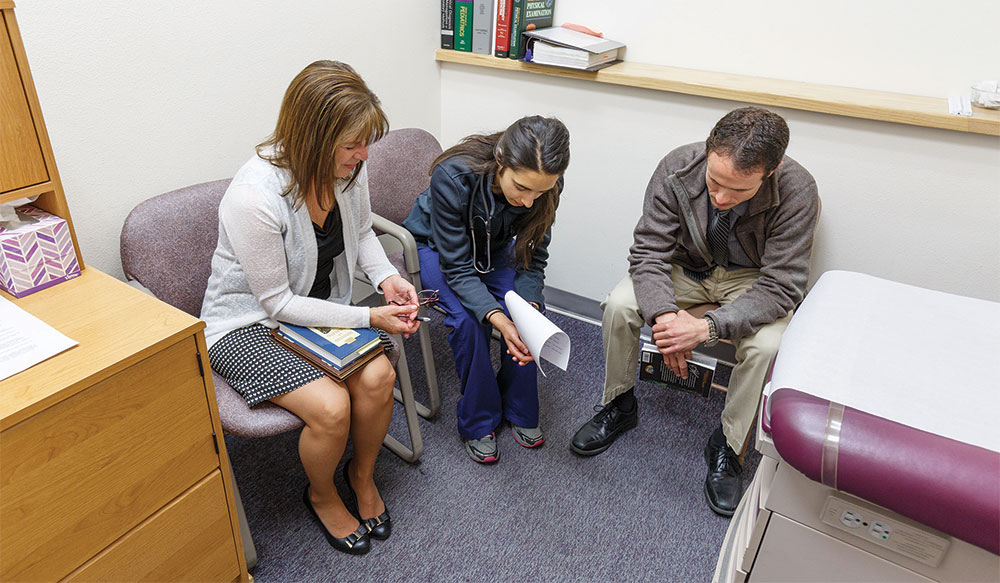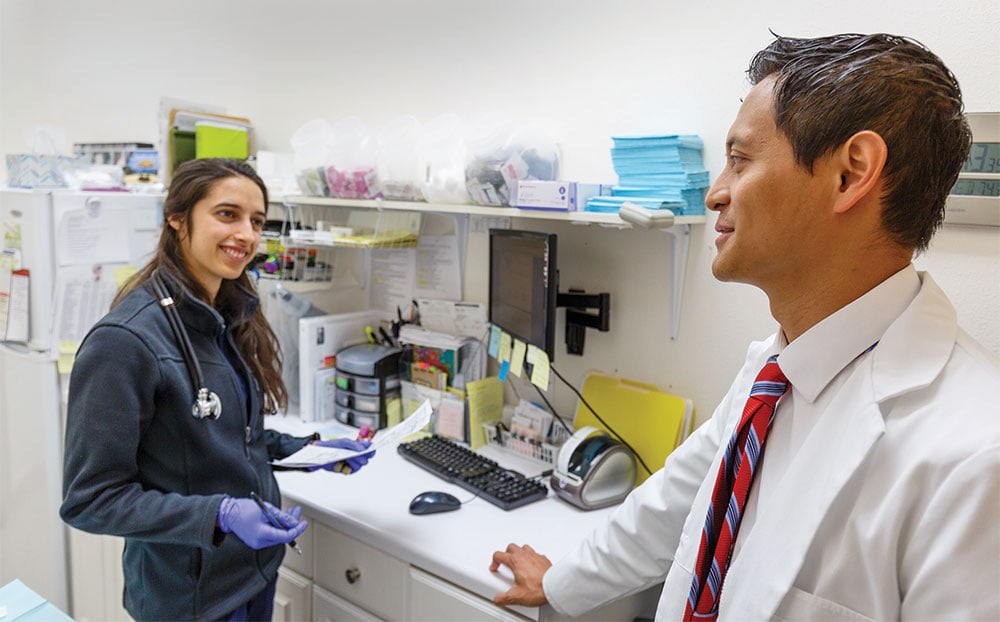
“Let me see redemption win;
Let me know the struggle ends,
That you can mend a heart
That’s frail and torn.
I wanna know a song can rise
From the ashes of a broken life,
And all that’s dead inside can be reborn . . .”
There’s a chaos when you’re suffering; there’s a darkness,” murmurs the young physician with the solemn eyes. “C. S. Lewis once wrote, ‘God whispers to us in our pleasures, speaks in our consciences, but shouts in our pains. It is his megaphone to rouse a deaf world.’”
He pauses to gather something deep inside himself. “I know that to be true,” he says quietly. “In those moments of crisis, we learn a deeper seeking of His will for us.”
Like thousands of third-year medical residents across North America, Andrew Roquiz was arranging his future with the same careful precision that had brought him through six years of medical training. The oldest child of Placido and Nida Roquiz, Adventist Filipino immigrants who had themselves gone on to successful medical careers as a general surgeon and a nurse, Andrew was positioning himself to follow an established pathway to professional and personal success.
He had landed a coveted position as a third-year resident at Kaiser Permanente’s Woodland Hills facility northwest of Los Angeles and just two hours’ drive from where he had earned his medical degree at Loma Linda University. Along with five other third-year colleagues, Andrew had reason to expect a six-figure contract offer from Kaiser Permanente to work for the well-regarded healthcare corporation following successful completion of his board exams.
He was engaged to a young woman whom he had been dating for two years, and it was a relationship for which he had regularly sought God’s leading and blessing. The future seemed promising for the young couple.
And then his world began to disintegrate.

Andrew’s fiancée broke off their engagement, even as he sought to keep the relationship moving forward with entreaties and pledges. Dejected by what seemed a major personal failure, and still uncertain about whether God wanted him to embrace the likely Kaiser offer, he found solace in the words of Tenth Avenue North’s anthem:
“Let me see redemption win;
Let me know the struggle ends,
That you can mend a heart
That’s frail and torn.”
On his way to make one more plea to his former girlfriend, he listened to a sermon by Pioneer Memorial Church pastor Dwight Nelson about God’s renewing work. Roquiz still quotes Nelson’s Isaiah 43 text from memory:
“Forget the former things;
do not dwell on the past.
See, I am doing a new thing!
Now it springs up; do you not perceive it?”
“I realized that God was saying ‘No, you need to let this relationship go,’ Andrew recalls, his eyes still narrowing with the memory. “Instead of continuing on to see my former fiancée, I went instead to my sister’s house, and told her of the direction I felt God was giving me.”
“Even though she was a strong supporter of our relationship, she accepted what God had given me, and just held me and wept. The next morning as she and I drove to church, we heard the Tenth Avenue North song on the radio—echoing the heartcry I was sending out to God. And wouldn’t you know,” he says, a broad smile creasing his face, “that the same song was played as the closing number of the worship service? My ears were now tuned to the fact that something new was going on.”
“I had considered myself a faithful Adventist Christian,” Andrew continues. “I was reading my Bible daily, praying regularly, and even praying with patients as I could and where they invited me to do so. But there were rough edges God was clearly seeking to smooth out. I was learning lessons I needed—learning to trust Him in the midst of my pain. I was also learning to let go of my lifelong need to be in control.”

Encouraged by his sister, a family medicine resident who had briefly visited a privately-operated wholistic medicine practice in northern Idaho, to apply for a medical rotation there, Andrew sought and received permission from his Kaiser supervisor to spend two weeks in September and October 2013 there under the direction of ASI member Dr. John Torquato. He found the experience fascinating—and perplexing.
“Within the first few days at the Hayden (Idaho) clinic, I could tell that God was doing something in my life,” Andrew recalls. “Not only did I have an attending physician unlike any I had ever experienced in my residency program—someone who picked me up at the airport, allowed me to stay in his home and eat at his table—but I found myself earnestly praying and truly wrestling with God about His call in my life.”
“I was having these incredible, unhurried conversations with John about the meaning of medical ministry. I would watch him working with patients, going beyond the usual professionalism I had seen with other attending physicians to gently inquire about the spiritual health of his patients.”
“On about Day 3, God put me under conviction,” Andrew remembers with a slow smile. “God slapped me—with the story of the rich young ruler—as we read it for worship. And I couldn’t get it out of my mind. I began to think about that young man’s potential for wealth and influence, and I began to see the similarities to the path I was on.”
Daunted by the prospect of a $200,000 per year offer from Kaiser Permanente back in Woodland Hills, Andrew wrestled with the dramatic change of direction he felt prompted to make. His attending physician earned only a quarter of that sum annually, and frequently struggled to meet professional and personal expenses because of his commitment to live on an Adventist Church pastor’s wage instead of a more traditional physician’s income.
“But God impressed me—‘The work you are observing is what I want you to do.’ So I went to my attending physician and told him, ‘I think God is calling me to work with you.’”
The young doctor didn’t get the response he was expecting from his older mentor. “‘Why don’t you go and talk with some other lifestyle physicians first?’ he asked me. ‘Talk to those guys first. See if perhaps God is calling you to work with one of them.’”
Roquiz grins as he adds the punchline: “He actually gave me the time off to look at other alternatives.”
After carefully investigating another wholistic health medical practice in southern Idaho, Andrew returned to his temporary quarters in Hayden under even deeper conviction—and greater struggle.
“My forehead was literally to the floor, and I was saying to God, ‘I can’t do this: I can’t do this.’ But God was saying back to me, ‘Which way are you going to choose?’ The pressure to make a decision about God’s call in my life just kept building up and building up. Finally, I said, ‘God, I can’t surrender this right now, but if you can help me with my unwillingness to surrender, I’m willing to try to be willing.’”
Andrew returned to his residency program in Woodland Hills, sensing a deepening call to the kind of whole life medical ministry he had witnessed in Hayden, but focused in the short term on completing his traditional medical training. His fellow residents, however, could hardly believe that he was considering a low-paying, “experimental” kind of medicine that had almost nothing in common with the generous opportunities both he and they were being offered.
“My peers were all talking about their plans for the future,” Andrew remembers. “The conversations were all about nice jobs with great benefits, and the opportunities to make a great impact on our communities and in our profession. Part of me was truly embarrassed—at least initially—by what I felt convicted God was urging me to do. Sometimes it’s really hard to find the vocabulary to describe a deep, inner conviction that doesn’t point where others seem to be going.”
Roquiz spent the autumn asking himself repeatedly, “What do I do with this? What do I tell people? If I go to Idaho, will I only be there for a year and then be done?” He says that his previous life goals to be financially and professionally successful frequently disturbed his peace.
“Ultimately, the sense of God’s calling my life was like Jesus’ parable of the yeast working itself through the dough—subtly but definitely there, changing me from the inside. I was gradually coming to peace that maybe I could do what God was calling me to do.”
“One of my colleagues showed me his offer from Kaiser for more than $230,000, with a generous signing bonus—very similar to what I would likely be offered. I realized that I was looking at what could have certainly been mine. But I looked at his offer, and, by God’s grace, I was OK with it. I was OK with the fact that I wasn’t going to earn anything like he would.”
Halfway through his last year of residency, Roquiz picked up the phone and called his mentor in Idaho. “I still want to learn from you,” he told Dr. Torquato.
The doctor replied with unvarnished candor: “If you come up here to work with me, you should know I’ve got no patients here I can give you. I’ve got no benefits for you. You’re going to have to work for every single cent you make.”
Andrew pauses for a long moment as his eyes close to focus on the strength of the memory.
“I was surprised at what came out of my month in response,” he says. “I told him, ‘Even if it means my financial ruin, I want to work for you.’”
The affirmation from his mentor was immediate: “Then let’s do this. Come up here, and God will make it work.”

By January 2014, Roquiz was back in Hayden for an exhaustive—and exhausting—round of weekend interviews with each of the 18 persons who worked either part or full-time in the Hayden walk-in clinic. In the remarkable decision-making process which they still practice, the collection of medical staff, Bible workers, pastors, and volunteers had concluded that they would not move forward with adding any new personnel unless all 18 agreed. Each member of the team had to believe that God indeed wanted the new physician to work with them: even one dissenting vote would be enough to derail the plan. The key question was put to each member of the team: “Is this person called to work in this place?”
After an intense weekend of conversations, Andrew returned to southern California to await the outcome of the unusual decision process. More than a week passed during which he wondered at God’s methods and timing.
“God wanted me to learn that when it’s time, I should let Him take control,” he remembers. “By then, I was staking my future on this opportunity.”
“My mentor called me after a week to say that ‘Eighteen out of 18 have confirmed that you have been called to this ministry,’” he said. “And I realized for perhaps the first time in my life that I was the object of God’s direct mercy and grace. Through most of my life to that point, I had earned my way—through college, through medical school—with hard work and good grades. But this was the first time I felt that God had truly given me something I didn’t deserve—that He had bestowed it on me as an act of grace.”
The 30-year old physician began his duties at the Hayden clinic in July 2014, serving as many as a dozen clients a day, and soon became integrated into a ministry team that extends well beyond the picturesque Idaho community to include the much larger population center 40 miles west in Spokane, Washington. There a multi-year church planting program led by Upper Columbia Conference pastor and church planting coordinator Wayne Kablanow has been building a modest but sustainable interface between health ministry and congregational life that began when Kablanow first pastored the Hayden Church from 2000-2010.
Two church plants in Spokane—North View and West Plains—are solidly committed to the principles of medical ministry first articulated by Ellen White more than a century ago. Both regularly plan events and ongoing processes to bring neighbors and friends practical help for health, lifestyle and spiritual issues.
Kablanow, whose 16 years working along the Hayden-Spokane corridor have given him a keen knowledge of the region and its potential as an incubator for medical missionary work, is the primary architect of the multi-year effort into which Roquiz and many others have now been integrated. As the longest-serving member of the ministry team, he has had a major role in casting a vision for church-planting that focuses on medical ministry and health outreach.
A willingness to experiment—and acknowledge mistakes and missteps—has guided Kablanow and the team to try unusual forms of evangelism. A four-week evangelistic series in the summer of 2013 that merged the efforts of Amazing Facts evangelist Darren Bartell and Dr. Torquato brought the realization that community residents required a longer calendar and more frequent contact to make the lifestyle changes that undergird renewed spiritual life. Out of that realization have grown such programs as the every-other-month “Dinner with the Doctor” health education series featuring a high-quality vegetarian meal and lecture by one of the team doctors. Each monthly event is “packed out,” with nearly 75 attendees.
In the summer of 2014, six young adult Adventist “health coaches” were also engaged to work with clinic patients in Hayden to design customized lifestyle programs that helped clients make positive changes in weight management, cooking nutritious meals, and exercise. One year later, four health coaches were employed in Spokane on either side of the early August “Your Pathway to Health” event that ultimately served more than 3,100 residents with free medical, dental, and optical care. The health coaches followed up with Pathway attendees, inviting them to events where they could learn new lifestyle practices, even visiting in homes to help attendees with personalized exercise classes and cooking lessons.
Asked what makes the region’s approach to ministry different from traditional congregational life, Kablanow pauses only for a moment to frame his remarkable conclusion.
“This isn’t about ‘doing church’ as usual,” he says. “Medical ministry gives church members a way to love the people in the community as we should. It’s not about them finding us, and thus finding the truth. It’s about us loving the community as Jesus has called us to love them. I’m personally convicted that medical ministry and classic gospel ministry will have to be combined—integrated—into one functioning reality before we can expect the latter rain of the Holy Spirit to fall.”
A second walk-in clinic, offering affordable medical care to Spokane residents inside a large Rosauers grocery store, opened in 2013 and brings both the practice and principles of wholistic health to populations otherwise only served by standard medical care or else not served at all. Roquiz and his mentor are joined at both sites by a nurse practitioner, a physician’s assistant, a registered nurse, receptionists, and affiliated Bible workers and health coaches.

Roquiz is only one of several committed young adults to join the ministry team. Michelle Maier, a 2013 nursing graduate of Southern Adventist University, works as both a nurse and a health coach for patients who seek more than office care. Before joining the ministry team, Michelle worked in short-term ministries during and after college, including health outreach in rural southern Mexico, preaching for a ShareHim evangelistic series in Guatemala, and as both a Bible worker and literature evangelist. She joined the Hayden team in the summer of 2014 as one of the health coaches, but stayed on past her planned three months to work year-round as both a clinic nurse and health coach, even as she finished her online bachelor’s degree in nursing in 2016.
Michelle traces the hand of God guiding her through her varied roles and ministry experiences. “It’s easy to go to someone and have them tell you what to do rather than having those intense wrestling times with God,” she says solemnly. “These moment of desperation and pleading with God seem more time consuming than receiving an already digested experience, but they are the life of the soul.”
Like Andrew, she frequently prays with patients if they illustrate a willingness to discuss spiritual matters, and carefully monitors each patient’s “whole health” through regular diagnostic routines and available in-home coaching.
“Just yesterday, we had a young woman—the mother of an eight-month old—in our clinic for serious shoulder pain that was preventing her from exercising,” Michelle says. “As part of our intake assessment, I learned from her that she had recently quit smoking, but was still experiencing cravings. I suggested that it’s often good to replace one unhealthy habit with a good one, and she revealed that she had replaced her smoking habit—with deep anxiety.”
“When I learned that she believed in God, I shared my own story of how spending time with God in prayer relieves anxiety, which seemed to bring her real comfort. I alerted Dr. Roquiz to the challenges the patient was experiencing so that he could address her needs from a whole-health perspective. As she was getting ready to leave the clinic, I offered her a copy of Ellen White’s The Desire of Ages, and mentioned that it was the most read book on the life of Christ. She was so incredibly grateful. She had received well-rounded care on all her points of need.”
“God is able to minister through us from the front desk, to the assessment, to the clinical visit, to the labs, to the follow-up phone calls.”
Erik Kelly, a graduate of Vanderbilt University’s nurse practitioner program, also engages with multiple patients each day at one or the other of the walk-in clinics. Like both Andrew and Michelle, he describes a long journey to become part of the ministry team in Hayden and Spokane.
Uncertain of where God was directing him, or what career path to pursue, he took a year at both Walla Walla University and La Sierra University before completing a 2007 degree in chemistry at Southern Adventist University in Collegedale, Tennessee.
“This isn’t about ‘doing church’ as usual,” Kablanow says. “Medical ministry gives church members a way to love the people in the community as we should.”
For two years, Erik served in central California as a Bible worker and literature evangelist. In 2009, he enrolled at Andrews University, where he pursued a master’s degree in church history at the Seventh-day Adventist Theological Seminary. It was a research project on Ellen White’s counsels for medical missionary work there that redirected his professional and spiritual goals. He ultimately applied for and was accepted to the Vanderbilt accelerated NP program, finishing the two-year program in late 2015 after a brief stay at the Hayden facility as part of his clinical rotations.
“Everything I’ve been wanting to do—they have the same vision for that here,” he says of the medical ministry team he joined in December 2015. “These people—especially the doctors—they’ve invested in me; they’ve taken the time to mentor me. I want to stay here and be a blessing to them and to the church.”
Erik is a member of the North View company on Spokane’s northern edge, and moves between clinic responsibilities and community outreach with church members. “I work at a clinic whose reason for existence is ministry to those who walk through the door,” he says. “And I work at a church that sees helping people as a way of life-—a walk—rather than an event.”
“Our congregation is an incredible blessing to us, and it’s our desire to be a church that blesses the people God helps us find,” he says. “When community residents come to a clinic like ours, we see them such a brief time. They need people out there with them, in their homes, helping them make new lives possible both physically and spiritually. We can’t rely on them finding us. We have to go to them.”
Each morning, the team at each clinic gathers to specifically pray for all the persons who have scheduled appointments for the day, as well as those who walk in on the spur of the moment. They remind each other of the spiritual challenges some returning clients are experiencing, and make careful plans to come alongside patients with encouragement and offers of practical help. No one hurries up the prayer time as each client name is read aloud: there is a palpable sense that each team member wants to carry the presence of God with them into the day’s duties and interactions.
For Andrew Roquiz, the two-year sojourn in Idaho will get dramatically less lonely on July 24 when he weds Melanie Tangunan, a childhood friend with whom he went through Adventist elementary and secondary schools, and who has been teaching for the last nine years in Adventist schools in the Orlando area. Their emerging romance—cautious, but increasingly committed—blossomed after Roquiz found his calling in Idaho, and the two have spent all available vacations together—and hundreds of hours on the phone—as they have navigated a long-distance relationship. Both of them say that they recognize that what seemed random events and painful experiences have actually contributed to building their strong relationship, and to discovering God’s unfolding will. After a one-week honeymoon, the newlyweds will settle into an apartment in Hayden, more than 2,500 miles from the region and families that once were “home.”
“This story begins with suffering,” Andrew grimaces. “I’ve often wondered if there’s another way to tell it. But the narrative definitely begins there—with suffering, through wrestling with God.”
“Somehow the suffering and the struggle and the seeking and the crying out leads to new things that God can do in your life. I’m convinced that I wouldn’t be in Idaho—and Melanie wouldn’t be joining me there—unless I had gone through that pain some years ago.”
His eyes focus on a far corner of the room, and his voice grows quiet: “I don’t think God causes suffering. There’s no evidence of that in His Word. But for whatever reasons, when humans make choices, God can work through those experiences to transform and change us. God allows us by His merciful hand to pass through these experiences. But He’s also right there—in the center—experiencing all of it with us.”
*Lyrics from “Worn” by Tenth Avenue North (2013).
Bill Knott is executive editor of Adventist Review.